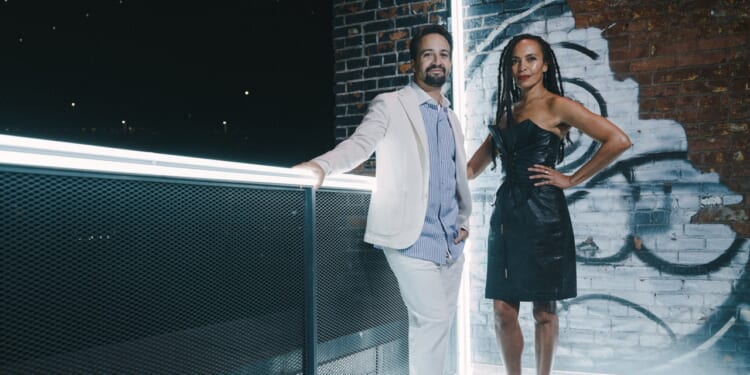The bulk of the duo’s work taking place in 2023—a year recognized as the 50th anniversary of hip-hop—also informed their take on the genre’s origins and social consciousness. The two spent that year sending each other genre-based playlists to hone each sound before Miranda enlisted star producer Mike Elizondo (a Dr. Dre protegé with whom he’d worked on Encanto’s “We Don’t Talk About Bruno”).
“It’s typical Lin,” says Elizondo, who is based in Nashville, “where things just start happening and you have to go with it, and eventually it becomes official.” If he hadn’t texted Miranda during a visit to New York, “maybe he wouldn’t have asked. With him, you just say yes and then figure out the details, because you know it’s going to be a lot of fun.”
Eventually, Miranda and Davis invited Elizondo to join them upstate, where they made some demos before laying down tracks in Nashville this past summer. The idea to engage Nas as a collaborate came up early on in the process, and convincing the Queens-raised musician, who Miranda calls a superfan of the movie, was simple enough.
“The challenge, then, was: how do you write a verse good enough for Nas?” Miranda says. When the chess phrase “Queen’s Gambit” came into his head, gears started turning. Miranda trained the data analytics software LexisNexis on the online lyrics encyclopedia Genius to see if Nas had ever used that term in his songs. “If he had, I’d have to go back to the drawing board. But we had lunch together and I played it for him in the car afterwards and, as soon as he hears ‘Queen’s gambit / pawns out / control the center,’ I saw him [stop in his tracks]. I’d found the one Queens metaphor he had not yet used.”
Getting other rap legends to appear on the album became easy once Nas had agreed to executive produce. As Elizondo says, “Lin’s clout goes a long way. Pretty much all the asks that went out, people came back intrigued, even those who had never even seen the movie. The fact that it was a full-length concept album felt like something exciting to be a part of.” Still, a few rappers were hesitant to let other writers draft their lines. “Emcees write their own rhymes,” Miranda says, “and the way we had to pitch it was that they’d be playing a character. These are not Cam’ron lyrics, this is Cam’ron playing Manhattan and embodying the spirit of the Manhattan crews. During recording, Busta [Rhymes] turned to me and said, ‘I have never let anyone else write lyrics for me.’ It really required a mental shift for a lot of these emcees to play these roles.”














